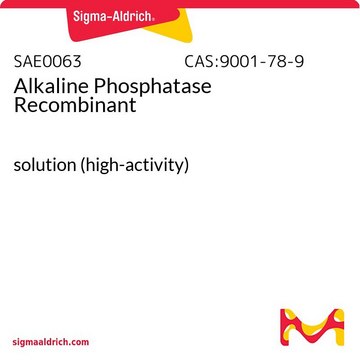Alle Fotos(1)
Wichtige Dokumente
SAE0111
Phosphatase, alkalisch, aus der menschlichen Plazenta
≥10 units/mg solid (in glycine buffer)
Synonym(e):
Phosphatase alkalisch aus menschlicher Placenta
Anmeldenzur Ansicht organisationsspezifischer und vertraglich vereinbarter Preise
Alle Fotos(1)
About This Item
CAS-Nummer:
MDL-Nummer:
UNSPSC-Code:
12352200
NACRES:
NA.54
Empfohlene Produkte
Biologische Quelle
human placenta
Spezifische Aktivität
≥10 units/mg solid (in glycine buffer)
UniProt-Hinterlegungsnummer
Lagertemp.
−20°C
Angaben zum Gen
human ... ALPP(250)
Suchen Sie nach ähnlichen Produkten? Aufrufen Leitfaden zum Produktvergleich
Anwendung
Alkaline phosphatase is used for conjugation to antibodies and other proteins for ELISA, Western blotting, and histochemical detection. It is routinely used to dephosphorylate proteins and nucleic acids. It may be used for protein labeling when high sensitivity is required. Alkaline phosphatase may be also be used to dephosphorylate the 5′-termini of DNA or RNA to prevent self-ligation. DNA or RNA can also be tagged with radiolabeled phosphate (via T4 polynucleotide kinase) after dephosphorylation with alkaline phosphatase.
Biochem./physiol. Wirkung
Alkaline phosphatase dephosphorylates proteins and nucleic acids. Human placental alkaline phosphatase (PLAP) has an unique residue, Glu-429. It is an allosteric enzyme that is uncompetitively inhibited by L-Phe, L-Trp, and L-Leu. PLAP is post-translationally modified. Phosphatidylinositol-specific phospholipase C may be involved in the release of PLAP. PLAP may have a role in cell division and may be involved in the transfer of maternal IgG to the fetus.
Einheitendefinition
One unit will hydrolyze 1.0 umole of P-Nitrophenyl Phosphate per minute at pH 10.4 at 37 Deg C.
Signalwort
Danger
H-Sätze
P-Sätze
Gefahreneinstufungen
Resp. Sens. 1
Lagerklassenschlüssel
11 - Combustible Solids
WGK
WGK 1
Flammpunkt (°F)
Not applicable
Flammpunkt (°C)
Not applicable
Hier finden Sie alle aktuellen Versionen:
Besitzen Sie dieses Produkt bereits?
In der Dokumentenbibliothek finden Sie die Dokumentation zu den Produkten, die Sie kürzlich erworben haben.
Unser Team von Wissenschaftlern verfügt über Erfahrung in allen Forschungsbereichen einschließlich Life Science, Materialwissenschaften, chemischer Synthese, Chromatographie, Analytik und vielen mehr..
Setzen Sie sich mit dem technischen Dienst in Verbindung.





